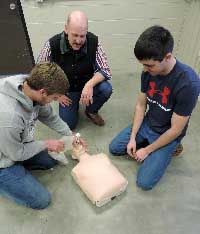Agriculture is the most dangerous industry in the nation, according to the National Safety Council. Fatality and serious injury rates run high. Human error is a factor, as well as the abundant workplace hazards – from cantankerous cows to toxic chemicals to underground manure pits and overhead power lines. Consequences may include drowning, electrocution, suffocation, loss of limbs and pulmonary diseases.
Since 1999, Michael Zierke has taught about ag industry hazards, as well as safe work practices, to students enrolled in the Farm and Environmental Safety class at Northeast Community College in Norfolk. He and his students plow through a more than 450-page textbook during the two-credit, semester-long course. The course is required for agricultural majors obtaining an associate’s degree from Northeast.
The 13 chapters in the “Farm and Ranch Safety Management” textbook, published by Deere & Company, cover hundreds of ag-related safety topics. Included are hand and power tools; grain and livestock dust; silo and manure pit gasses; grain storage; livestock and a wide range of machinery.
Zierke emphasizes that “safety is everybody’s job. Be your own safety director. Lives change in just seconds of time because of accidents.”
Special emphasis is paid to the agricultural industry during National Ag Month in March and especially during National Ag Week, March 10-16. It’s a good reminder for the rural sector to “think safety in all they do,” Zierke said. “Safety should always be a farmer’s or rancher’s first concern for themselves and their families.”
Zierke, a mechanized agriculture instructor, grew up on a Pierce farm and resides on a Pierce County acreage.
“Having a farm background, I can bring real-life situations into the classroom,” he said. “I can tell them about my near misses with both livestock and machinery.”
Zierke added: “I think my students respect what I’m teaching because of my experiences. I’ve not only had farm experience, but I’d also worked a factory job (previously). I’m able to bring farm and industry into the classroom.”
“In teaching the classes, it’s made me think about my own safety, especially with my teen-age daughter watching what I do,” Zierke said. “That’s one of the things I emphasize to my students, that what they do, their younger family members or friends may try to do themselves even though they’re not physically or mentally capable of doing it.”
Zierke said he typically devotes seven class periods to cardiopulmonary resuscitation (CPR) and first aid.
Students Colby Lange, Crofton, and Michael Mensik, North Bend, said they are especially thankful for the opportunity to learn CPR. The freshmen mechanized agriculture majors completed the Farm and Environmental Safety class last semester.
Mensik said that it’s “definitely good to learn CPR in case (a relative) has a heart attack. You can keep them alive if out in the middle of nowhere.”
Lange said he came into the class thinking “I’m safe on the farm,” but quickly learned of the potential hazards lurking on farms.
Accidents can be traumatic and life changing.
When working on farm and ranch tasks, Zierke said, “Take more time. Think about what you’re going to do before you do it. (An accident) is not worth getting in a hurry.”
He also offered the following ag safety-related tips:
Read the operator manual
Wear appropriate clothing
Set boundaries for younger family members, such as assigning age-appropriate tasks
Wear such personal protective equipment as helmets and masks when needed
Devote a separate washing machine to launder chemical-contaminated clothing
Pay attention to chemical labels for your personal safety and those around you
Understand workplace hazards
When working with livestock, always have your guard on
--###--
PHOTO CUTLINE
Instructor Michael Zierke (center) and Michael Mensik (right), North Bend, observe as Colby Lange, Crofton, practices cardiopulmonary resuscitation (CPR) using a bag ventilator that forces air into lungs. Mensik and Lange are freshmen mechanized agriculture majors who completed Zierke’s Farm and Environmental Safety class at Northeast Community College in Norfolk last semester.

